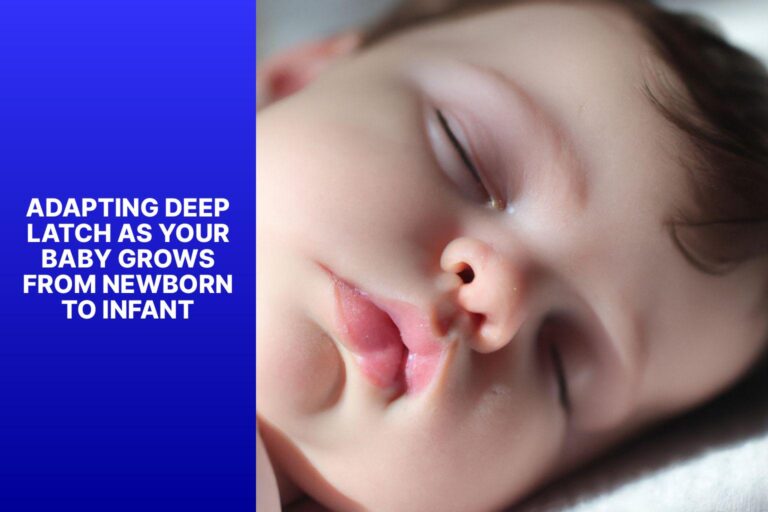Why Am I Not Losing Weight While Breastfeeding – Tips
Navigating the postpartum period can be a complex journey, filled with joy, challenges, and a host of questions. A common question that new mothers often find themselves asking is, “Why am I not losing weight while breastfeeding?” This query becomes more puzzling when we consider the widespread belief that breastfeeding should naturally lead to weight loss. The connection between breastfeeding and weight loss, however, is not as straightforward as it seems.
Here we seek to unravel this mystery, exploring the relationship between breastfeeding and body weight, examining why some women lose weight during breastfeeding while others don’t, and providing effective strategies to help breastfeeding mothers reach their weight loss goals. Let’s delve into this fascinating topic and provide some clarity for all the new moms out there.
Unraveling the Mystery: Why Aren’t I Shedding Weight While Nursing?
It’s a question that many new moms often find themselves asking in bewilderment: “Why am I not shedding weight while nursing?” Despite the energy-intensive process of breastfeeding, some women find the postpartum weight clinging on, defying their expectations of natural weight loss. The answer to this puzzle lies not just in how many calories are burned during breastfeeding, but in an array of other physiological, lifestyle, and nutritional factors.
Breastfeeding is a demanding process. The body works around the clock to produce enough breast milk to nourish the new baby. As a result, breastfeeding moms burn additional calories, often cited as 300 to 500 extra calories per day, akin to running a few miles or participating in a moderate workout. Given this considerable caloric expenditure, one might naturally assume that these extra calories burned would automatically lead to weight loss. However, the reality is that weight loss during breastfeeding is not a guaranteed outcome for all nursing moms.
The Complex Connection Between Breastfeeding and Body Weight
The link between breastfeeding and body weight is a complex puzzle that confounds many new mothers. While breastfeeding burns extra calories—around 300 to 500 daily—the anticipated weight loss doesn’t always follow. Hormonal fluctuations, particularly of prolactin, simultaneously stimulate milk production and appetite, often leading to an intake of extra calories. Physiological changes, like increased fat stores and water retention, also contribute to maintaining the extra weight as an energy reserve. Lifestyle elements like sleep deprivation and decreased activity level further complicate the weight loss equation. For successful postpartum weight loss, it’s essential to focus on a nutrient-dense diet, regular physical activity, and most importantly, patience, as every mother’s journey is unique and takes time.
Do Calories Burn During Breastfeeding?
Breastfeeding is a calorie-burning activity! It’s estimated that nursing burns approximately 300-500 extra calories per day, comparable to a moderate-intensity workout. This energy expenditure is a result of your body producing breast milk, a process which requires substantial metabolic effort. However, it’s important not to fall into the trap of consuming empty calories to meet this increased demand. Instead, focus on a balanced diet with nutrient-dense foods – lean protein, whole grains, healthy fats, and plenty of water. Ultimately, a healthy diet and lifestyle are key to successfully losing baby weight while maintaining a robust milk supply.
Uncovering the Weight Loss Benefits of Breastfeeding for Some Women
Breastfeeding offers numerous weight loss benefits to some women, thanks to the substantial calorie burn involved in milk production. This energy-intensive process can lead to a natural shedding of the extra pounds gained during pregnancy. However, it’s crucial to note that this doesn’t occur uniformly for all breastfeeding mothers. Factors like genetics, diet quality, activity level, and stress levels can impact the rate of postpartum weight loss. The key to harnessing these benefits lies in maintaining a balanced, nutrient-dense diet and engaging in regular physical activity. By ensuring an intake of lean protein, whole grains, and healthy fats, while staying active and hydrated, nursing moms can promote both their milk supply and their weight loss goals.
The Paradox: Why Some Women Don’t Lose Weight While Nursing
While breastfeeding can assist in weight loss for some, it’s not the same story for every nursing mother – a paradox that often leaves many puzzled. Why is this so? Several factors come into play. Hormonal shifts during breastfeeding can stimulate hunger, leading to the consumption of extra calories. Increased cortisol levels due to sleep deprivation, common in the life of new parents, can also contribute to weight retention. Furthermore, the body naturally stores fat as an energy reserve for milk production. Therefore, it’s essential not to get disheartened and instead focus on healthy habits. Regular physical activity, a balanced diet rich in nutrient-dense foods, and adequate sleep can tip the scale towards postpartum weight loss over time.
Top 5 Factors Preventing Weight Loss During Breastfeeding
The barriers to postpartum weight loss while nursing are multifaceted. Understanding these barriers is the first step to overcoming them.
- The Pitfall of Inadequate Food Intake: Not consuming enough calories can trick your body into a ‘starvation mode,’ slowing down metabolism to conserve energy and leading to weight retention.
- The Dilemma of Overeating: With the increase in appetite from breastfeeding, there’s a risk of consuming more calories than the body burns, leading to weight gain instead of loss.
- The Impact of Chronic Stress: New parenthood is often accompanied by stress, which increases cortisol levels, promoting fat storage, especially around the abdomen.
- The Consequences of Reduced Physical Activity: It’s common for activity levels to decrease during the early postpartum period due to the demands of caring for a new baby, contributing to weight retention.
- The Hidden Influence of Hormones: Hormonal shifts during the postpartum period can influence weight, making it harder to lose the extra pounds.
The Hunger Dilemma in the Course of Nursing
Why Does Breastfeeding Make Me Feel Starving?
If you’ve been wondering why breastfeeding makes you feel famished, you’re not alone. This intensified hunger is due to your body working overtime to produce nutrient-rich breast milk, which requires a lot of energy. This energy need, in turn, triggers hunger signals, making you feel constantly hungry. Coupled with sleep deprivation and the demands of caring for a new baby, it’s no surprise that your energy levels are continually being taxed. The key to managing this hunger surge is not just eating more, but eating smart. Opt for nutrient-dense foods like lean proteins, whole grains, and healthy fats, and remember to hydrate well. Having regular, small meals throughout the day can also keep hunger pangs at bay while helping maintain your energy level and milk supply.
Deciphering the Impact of Hormones and Diet on Weight During Nursing
Key Roadblocks to Weight Loss While Nursing
There are three key factors to consider:
- The Hormonal Factor: Hormonal imbalances, particularly thyroid and adrenal gland dysfunctions, can hinder weight loss.
- The Diet Dilemma: The quality and quantity of food consumed play a huge role in weight management during breastfeeding.
- The Adrenal Effect: Chronic stress can overwork the adrenal glands, causing hormonal imbalances that can lead to weight retention.
Effective Strategies for Weight Loss During Nursing
Understanding the barriers is half the battle. Here are some strategies that can guide you towards achieving your weight loss goals while breastfeeding:
- Nutrition 101: What to Eat When Nursing: A balanced diet is crucial, especially when breastfeeding. For breakfast, consider whole grains and lean protein sources. For lunch and dinner, focus on nutrient-dense foods like lean meats, fish, whole grains, and a rainbow of fruits and vegetables. Snacking is inevitable, but choose wisely. Opt for healthy fats and proteins that keep you fuller longer and avoid sugary, empty-calorie snacks.
- Hydration: The Underrated Element of Weight Loss: Water plays an essential role in metabolism and milk production. Ensuring adequate water intake is an easy but often overlooked aspect of weight management.
- The Link Between Sleep and Weight: Lack of sleep can disrupt hunger hormones, leading to weight gain. Try to catch up on sleep whenever possible.
- Activating Weight Loss: The Power of Exercise: Regular physical activity, even light exercises, can help you burn extra calories and elevate energy levels.
Navigating Through Weight Loss Approaches
Is Dieting a Safe Option During Nursing?
The question of whether dieting is safe during breastfeeding is a common concern among new moms. It’s important to note that drastic or rapid weight loss through extreme diets can impact your milk supply and overall health, especially during the early postpartum period. Instead, the focus should be on balanced, nutrient-dense eating rather than dieting per se. Consuming enough calories, sourced from a variety of food groups including lean protein, whole grains, and healthy fats, is crucial for both maintaining milk production and promoting gradual weight loss. Also, staying hydrated and incorporating regular physical activity can support a healthy weight. Always remember to consult with a healthcare provider or a registered dietitian before embarking on any weight loss plan while nursing. It’s essential to prioritize both your baby’s and your own health during this critical period.
Realistic Weight Loss Expectations During Nursing
Setting realistic weight loss goals during nursing is key. Many new mothers are eager to shed the extra weight gained during pregnancy, but it’s important to understand that postpartum weight loss varies greatly from woman to woman. Factors like pre-pregnancy weight, weight gain during pregnancy, activity level, and genetic predisposition all influence the rate of weight loss. Remember, breastfeeding burns calories, but it also requires a substantial intake of nutrients to maintain milk production. It’s recommended to aim for slow, gradual weight loss, around 1-2 pounds per week, once your milk supply is well established. An overall healthy lifestyle, including balanced eating, regular physical activity, and plenty of sleep, should be your guiding principles. Keep in mind that the ultimate goal is to nourish your new baby while taking care of your own health. Patience and consistency will pay off in your postpartum weight loss journey.
Busting Myths: Breastfeeding, Weight Loss, and Milk Supply
Will My Milk Supply Dwindle If I Prioritize Weight Loss?
Moderate and gradual weight loss typically does not affect milk supply as long as nutrient intake remains adequate. However, rapid weight loss can decrease milk production.
Does Weight Loss Follow Post-Breastfeeding?
Weight loss can occur after breastfeeding stops, but it’s not guaranteed. It largely depends on maintaining healthy lifestyle habits established during breastfeeding.
The Role of Health Shakes in Weight Loss
Do Health Shakes Aid in Weight Loss?
Health shakes, when used judiciously, can indeed be a tool for weight loss, even during breastfeeding. They’re particularly beneficial when used as meal replacements for breakfast or lunch, as they can provide a quick, nutrient-dense option. For instance, a shake like In Shape Mummy is designed with the nutritional needs of nursing mothers in mind. It’s packed with essential vitamins, minerals, high-quality proteins, and fiber, all important for maintaining your energy levels and milk production. However, remember that these shakes should complement a varied diet, not replace whole food meals entirely. It’s also vital to steer clear of shakes that are high in sugar or contain artificial additives. While health shakes can aid in weight loss, they work best when part of an overall balanced diet and regular physical activity routine.
Emphasizing the Right Food Choices for Weight Loss During Nursing
The Golden Rule: Eat Healthily to Lose Weight During Nursing
Choosing the right foods is a critical aspect of losing weight during breastfeeding. Emphasize whole, unprocessed foods, lean proteins, healthy fats, fruits, vegetables, and whole grains.
Nutrition Plans Suited for Nursing Mothers
- Caloric Intake: The Ideal Number for Weight Loss: While individual caloric needs vary, nursing mothers should avoid dropping below 1500-1800 calories per day to maintain a healthy milk supply.
- What Should Your Plate Look Like? Foods for Weight Loss: Your plate should be balanced and colorful, including lean protein, whole grains, and a variety of fruits and vegetables.
- Specific Diet Plan Suggestions for Nursing Mothers: Avoid fad diets and focus on a balanced diet rich in lean proteins, healthy fats, and complex carbohydrates.
Conclusion
Understanding your body’s response post-birth is crucial, particularly once your milk supply stabilizes. During the first few weeks postpartum, your body is in a state of hormonal flux. This period is typically characterized by a higher caloric requirement due to increased milk production. However, as your body adjusts to breastfeeding and your milk supply regulates, your calorie needs may decrease, but it’s still important to maintain a nutrient-dense diet.
Remember, weight loss goals should align with maintaining a healthy milk supply. Fluctuations in weight are normal during this period and understanding this can help set realistic weight loss expectations. Be patient with yourself; breastfeeding and taking care of a new baby are strenuous tasks. Emphasizing a balanced diet, maintaining regular physical activity, and ensuring enough sleep can help manage weight while ensuring you have the energy for these new challenges. Always consult a healthcare provider with any concerns.
Achieving effective weight loss during breastfeeding involves a multifaceted approach that combines diet, exercise, and lifestyle modifications. A healthy diet rich in lean proteins, whole grains, fruits, and vegetables provides the nutrients necessary for both mother and baby. It’s important to avoid crash diets and focus instead on gradual weight loss, which is safer and more sustainable. Regular physical activity can help burn extra calories and build muscle mass, promoting postpartum weight loss. Incorporating exercises such as brisk walking or yoga can be an effective way to start.
Furthermore, maintaining a regular sleep schedule can help regulate hormones that control hunger and satiety. Lastly, stress management techniques such as mindfulness or deep-breathing exercises can help keep cortisol levels in check, aiding in weight loss. Remember, consulting a healthcare provider or a registered dietitian can provide personalized guidance for your weight loss journey.










